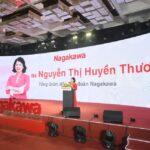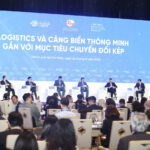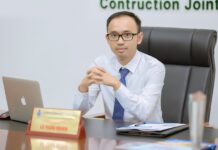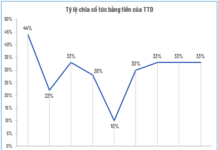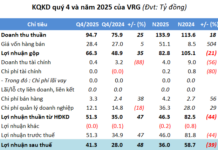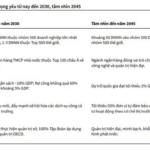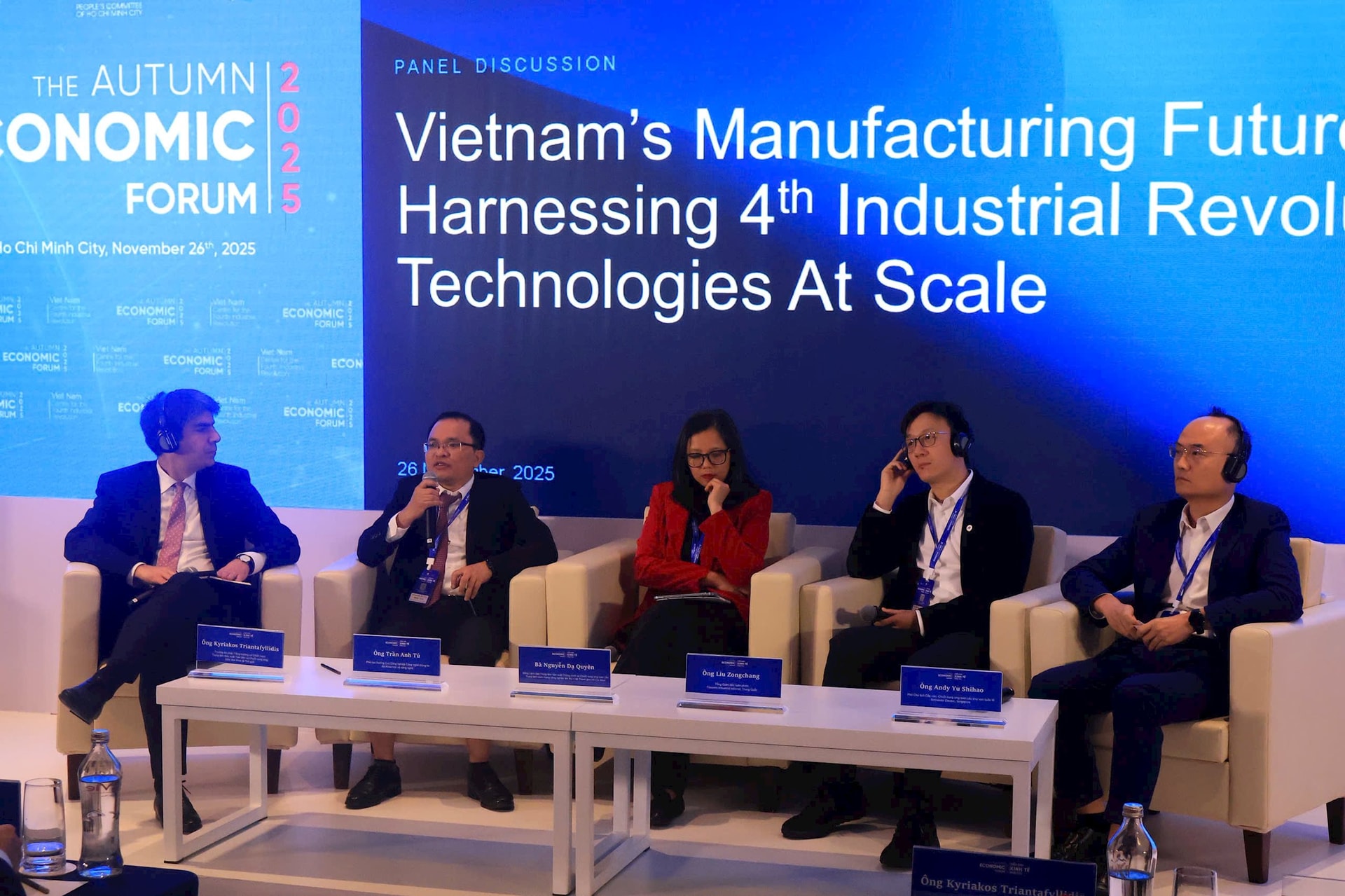
Autumn Economic Forum 2025 Discussion Session
On the morning of November 26, within the framework of the Autumn Economic Forum 2025 in Ho Chi Minh City, a stark contrast emerged between the production landscape of foreign-invested enterprises (FDI) and the struggles of domestic businesses. The specialized discussion session on the future of manufacturing, featuring representatives from the Ministry of Science and Technology and leaders of top technology corporations, delved beyond diplomatic commitments to focus on financial metrics and operational efficiency.
“The Giant’s Weapon: Growth Without Headcount Increase”
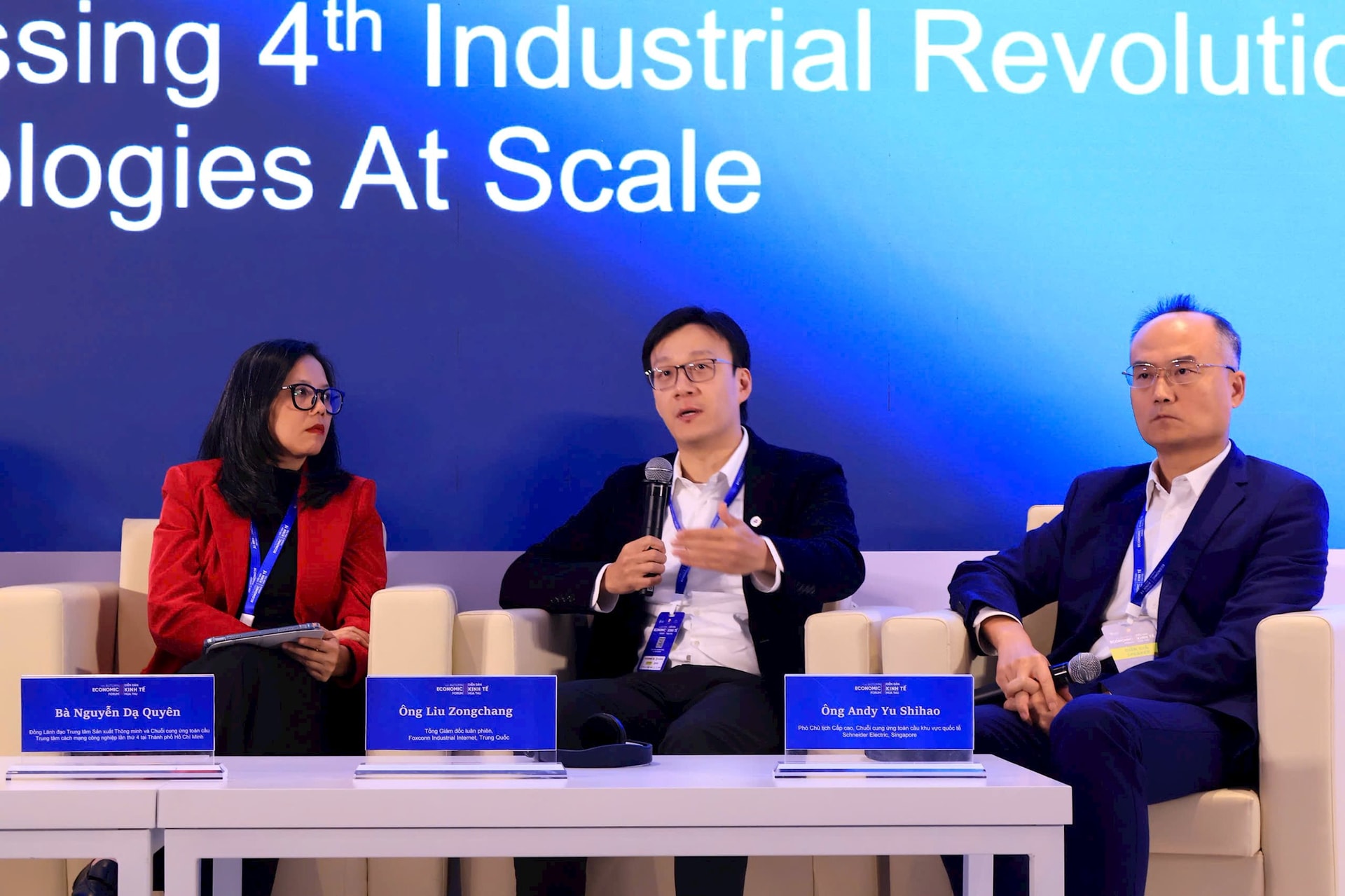
Dr. Zongchang Liu – Rotating CEO of Foxconn Industrial Internet
Kicking off the discussion, Dr. Zongchang Liu, Rotating CEO of Foxconn Industrial Internet (Fii), showcased the power of the “AI makes AI” model with concrete financial data. At the Huu Nghi 2 factory (Quang Chau Industrial Park, Bac Ninh) – Vietnam’s sole facility recognized by the World Economic Forum (WEF) as a “Lighthouse Factory” – technology is revolutionizing productivity.
According to Foxconn’s data, the implementation of synchronized supply chain and digital planning has reduced inventory levels by up to 35%. Notably, in the last fiscal year, Fii’s new technology applications in Vietnam saw an 83% revenue growth, while personnel increased by only 20%. This significant gap between revenue growth and headcount highlights a dramatic improvement in labor productivity (UPH up by over 50%), breaking away from the traditional labor-intensive growth model.
Echoing this sentiment, Mr. Andy Yu, Senior Vice President of Global Supply Chain at Schneider Electric, emphasized how technology is turning green standards from a cost burden into a competitive advantage. Data from Schneider’s supply chain operations across Asia and Europe shows that AI-powered visual inspection improves operational efficiency by 10% and minimizes errors, optimizing energy consumption in data centers.
“The Pain of Vietnamese Enterprises: When ‘Excel is Still King’
In contrast to the breakthroughs of foreign firms, Ms. Nguyen Da Quynh, Co-Leader of HCMC C4IR, candidly pointed out the biggest bottleneck for Vietnamese enterprises, especially small and medium-sized enterprises (SMEs). According to Quynh, about 60% of SMEs are still in the early stages of digitization, and the core issue is not the lack of equipment or advanced technology, but the shortage of clean data.
“In most Vietnamese companies, Excel is still King. Data remains fragmented across disparate systems, with departments using different, unstandardized spreadsheets. This prevents companies from having a single, reliable source of truth for accurate business decision-making,” Quynh noted.
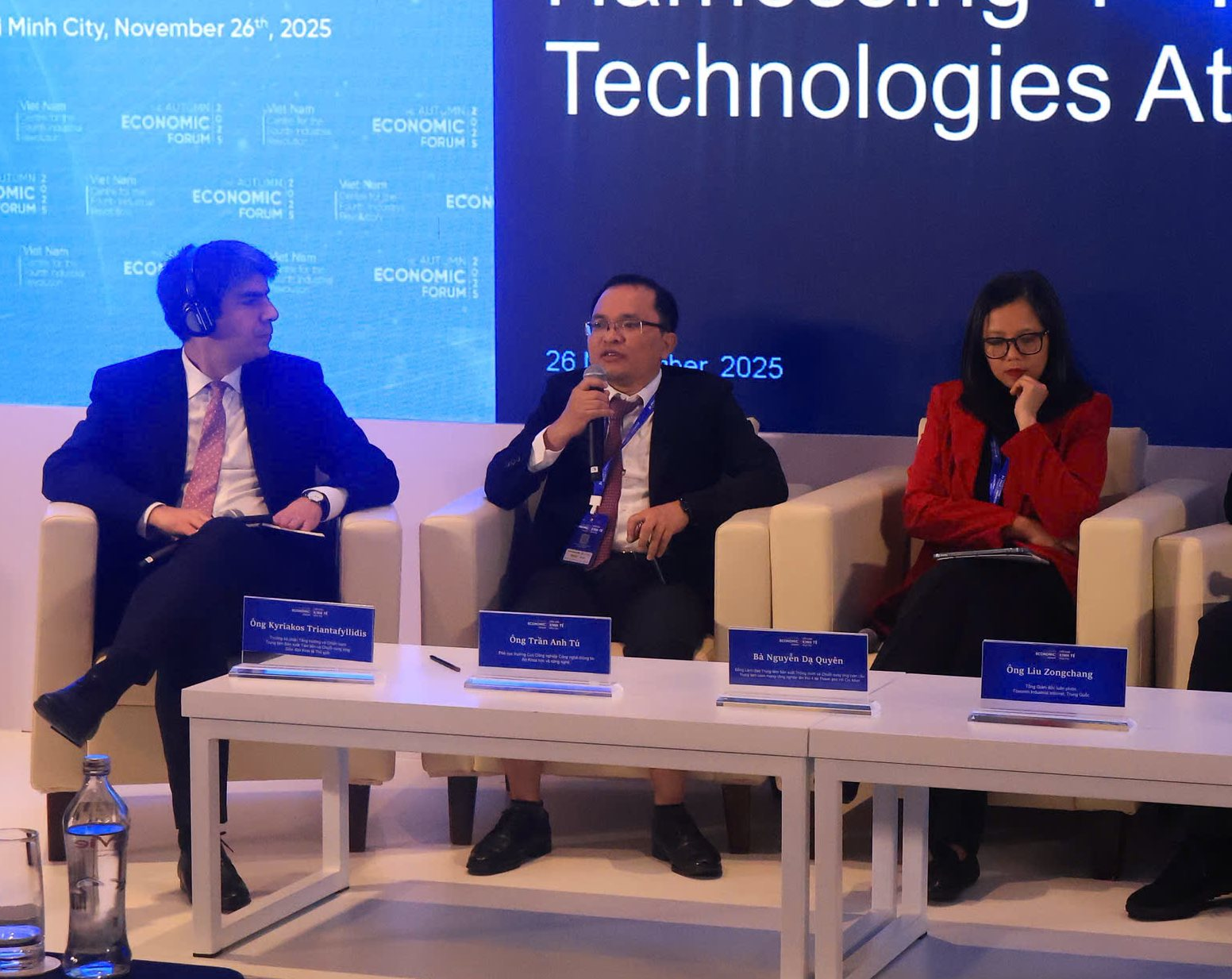
Mr. Tran Anh Tu, Deputy Director of the Information Technology Industry Department, Ministry of Science and Technology
Concurring with this view, Mr. Tran Anh Tu, Deputy Director of the Information Technology Industry Department at the Ministry of Science and Technology, advised that SMEs should not rush into AI or Big Data without a solid data foundation. The ministry recommends a pragmatic roadmap: starting with process digitization to generate data, standardizing databases as input, and then moving towards automation and AI applications.
To support this roadmap, Mr. Tu revealed that the government is focusing on completing the legal framework through controlled sandbox mechanisms for new technologies. The National Technology Innovation Fund will serve as a financial lever and knowledge connector, helping enterprises access international expert networks rather than providing mere capital support.
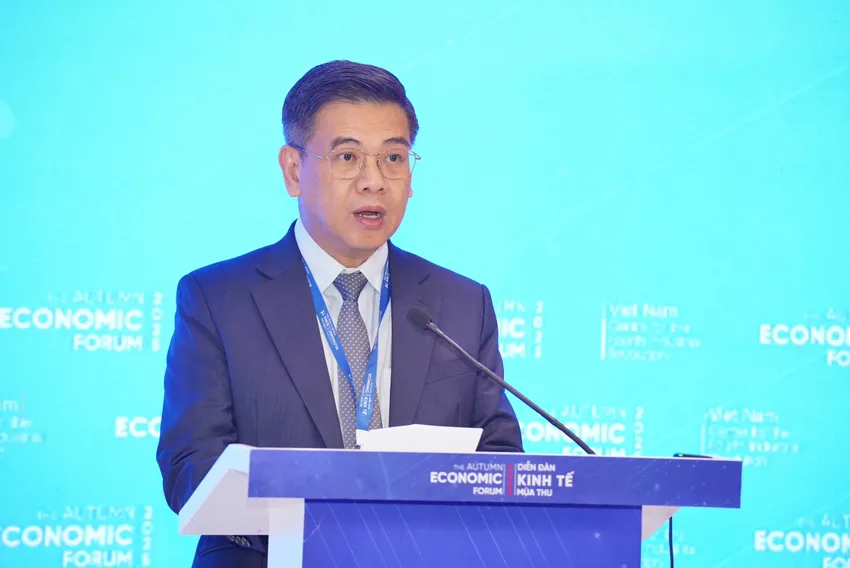
Vice Chairman of Ho Chi Minh City People’s Committee Nguyen Van Dung
Echoing this effort, Vice Chairman of Ho Chi Minh City People’s Committee Nguyen Van Dung stated bluntly, “We cannot continue competing with old advantages. It’s time to enhance productivity, master technology, and transform production models.” The city leader emphasized that smart factories are a mandatory path to optimize operations, ensure transparency, and reduce carbon emissions.
“Galaxy CEO’s Lingering Question: Assembly or Manufacturing?”
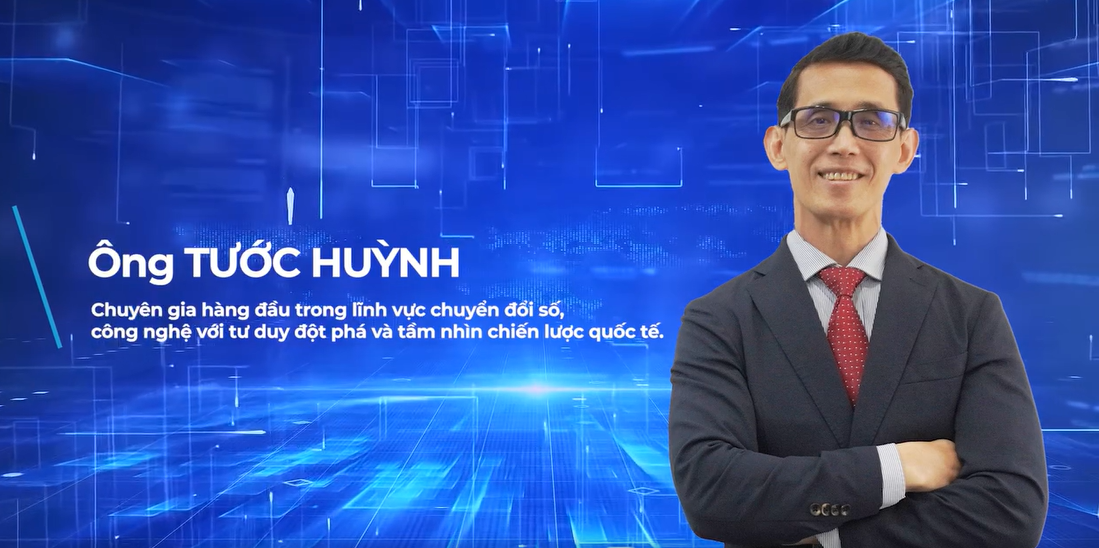
Huynh Kim Tuoc – Chairman and CEO of Galaxy Holdings
The session’s intensity peaked during the open discussion when Mr. Huynh Kim Tuoc, Chairman and CEO of Galaxy Holdings, directly questioned the panelists. With over 25 years of experience in technology, Tuoc bypassed technicalities to focus on Vietnam’s position in the global supply chain.
Instead of using fancy terms, the Galaxy Holdings leader highlighted the fundamental difference between “Assembly” and “Manufacturing.” Despite Vietnam attracting significant FDI and smart factories, if the country remains in the assembly stage, it will perpetually be a low-value-added labor provider. The pressing question is how Vietnamese enterprises can cross this threshold to become true manufacturers – mastering core technologies, owning R&D, and controlling the value chain, rather than just supplying labor and facilities.
“Solutions from Two Perspectives: Technical Roadmap and Practical Steps”
Responding to this concern, representatives from Foxconn and Schneider Electric offered complementary perspectives, outlining an escape route from the assembly trap for Vietnamese enterprises.
Mr. Zongchang Liu (Foxconn) outlined a three-step value chain upgrade: from System Assembly to Modules (subsystems), and finally to Core Components like Computer Chips. According to Liu, the biggest challenge in assembly is labor costs, but transitioning to modules and components requires automation and deep R&D capabilities. This “narrow gate” is the mandatory path to technology mastery and higher profit margins.
From a practical standpoint, Mr. Andy Yu (Schneider Electric) offered more actionable advice for businesses still grappling with Excel: “Don’t start with something too grand.” The key, he said, is identifying operational “pain points” and immediately applying affordable AI tools to address them. Schneider’s leader stressed that companies don’t need a large engineering team to build complex language models; they need personnel who can use AI tools to improve inspection and maintenance processes. These small, data-accumulating steps will lay the foundation for Vietnamese enterprises to climb higher in the global value chain.
Nagakawa CEO Honored as Outstanding Young Vietnamese Entrepreneur
Ms. Nguyễn Thị Huyền Thương, CEO of Nagakawa Group, has been honored as the Outstanding Young Vietnamese Entrepreneur of 2025. This prestigious Red Star Award, presented by the Central Committee of the Vietnam Young Entrepreneurs Association, recognizes her exceptional contributions to Vietnam’s economy.
Empowering Youth: Shaping a Smart and Sustainable Tomorrow
At the Autumn Economic Forum 2025, Vietnam’s youth emerged as the driving force behind the nation’s green and digital transformation in the age of AI, taking center stage as architects of its future.
Unlocking Vietnam’s Potential: The Rise of Smart, Sustainable Green Ports
Vietnam and Ho Chi Minh City hold immense potential to develop green ports, smart ports, and emerge as a regional logistics hub, according to domestic and international experts. However, realizing this vision requires significant breakthroughs in infrastructure, human resources, and regional connectivity.
Unveiling the Allure of the ‘AI in Action’ TV Competition: Decoding Its Irresistible Appeal
The inaugural episode of “A.I Thực chiến” will premiere on November 26, 2025, at 8 PM on VTV2, with a rebroadcast on November 28 at 9 AM on VTV3. As Vietnam’s first-ever AI-focused competition and a flagship national TV program on artificial intelligence, it offers a 1 billion VND cash prize, a 1 million USD scholarship, and the chance to become a “USD Millionaire Under 30” sponsored by Techcombank, Masterise Group, and One Mount Group.

